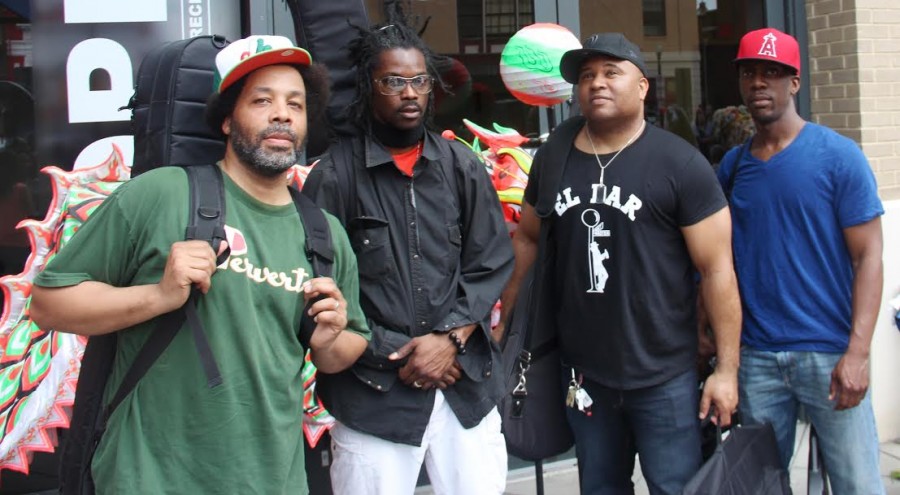New Year’s Day 2010 was one of the worst days of Terence Nicholson’s life, but he got his band’s best song out of it.
The singer/guitarist and leader of D.C. rock band Thaylobleu was helping his then-fiancée (now his wife) move from an apartment near 8th and Kennedy streets NW, when he bent over on the sidewalk to clean something off his shoe. He heard tires screech.
“I never even looked up. I just said to myself, y’know, ‘that sounded like a jump-out.’ And then the footsteps were coming closer. I look up, there were two cops that ran right up on me,” Nicholson says. They grabbed him.
“They sit me on the curb, cuff me, never told me why. There was a younger cop and an older cop. The older cop couldn’t wait to tear into me … the younger cop, he just said, ‘you fit the description,’ but he never said of what.”
It turned out that Nicholson’s North Face jacket and then-long dreadlocks were enough to cause a serious case of mistaken identity. He says the officers “paraded me up and down 8th Street while at the same time waiting to get an ID for whoever it was they were looking for,” he says. Eventually they let him go.
The ordeal—specifically being cuffed without an explanation why—caused Nicholson to contact Metro Police Chief Cathy Lanier, congressional Del. Eleanor Holmes Norton and other politicians. He got responses, but no official investigation was mounted.
It all led to an anthem, though: Thaylobleu’s “Locked,” a hard-driving tune that owes its energy to Bad Brains and ’70s metal. “There goes that chicken hawk circling/With that costume jewelry,” Nicholson sings—with the officers as his inspiration—while the main guitar riff by Darrell “DP” Perry punches forward and the rhythm section of Joe Hall (drums) and William Vaughn (bass) stays—yeah—locked.
The chorus—“I got it locked locked locked locked locked!”—is a true fist-pumper, and the second verse pulls away from the original incident to offer a dire warning for society in general: “Smoke em’ if you got em’/Baby, we goin’ out like Pompeii.”
Despite the confrontational tone of the song, Nicholson—who teaches kung fu and tai chi, works in summer-camp programs and also teaches art—says education is his primary goal. At shows he gives out ACLU pamphlets that explain how to handle a situation like his 2010 episode.
“It’s not even just about black folks, and you’re mistaking yourself if you think that it is … basically, just get your mind right, and understand the times that we’re living in,” he says, “because it’s going to get worse before it gets better. If it ever gets better.”
The 1991 graduate of the Corcoran School of Art—who went by Sub-Z in one of D.C.’s first noteworthy hip-hop groups, the jazz-influenced Opus Akoben (with Kokayi and Black Indian, both still active as MCs)—says he’s reached a certain level of acceptance that D.C. has irreversibly changed from the era when U Street was a funk and hip-hop hotbed in the ’90s. (Other members of Thaylobleu are deeply connected to D.C.’s hip-hop history: Perry is one-half of the pioneering Poem-cees, and Hall and Vaughn have been musicians in the scene for years.)
Nicholson had a moment of clarity when playing the Funk Parade festival in May on a big red carpet across the street from the famous Ben’s Chili Bowl. Looking around at the new buildings, “I had to process the idea that the U Street that I knew … it’s a playground, it’s like Disney World. I feel like the developers are the winners.”
The changes are “sad,” he says, but not stifling.
“My friends, we sort of made a collective decision that if we let what U Street in particular has become get in the way of our being creative, then we’ve lost,” Nicholson says. “So the idea is, keep on playing … I use this stuff as material.”
Thaylobleu plays the Kennedy Center Millennium Stage Aug. 23.


